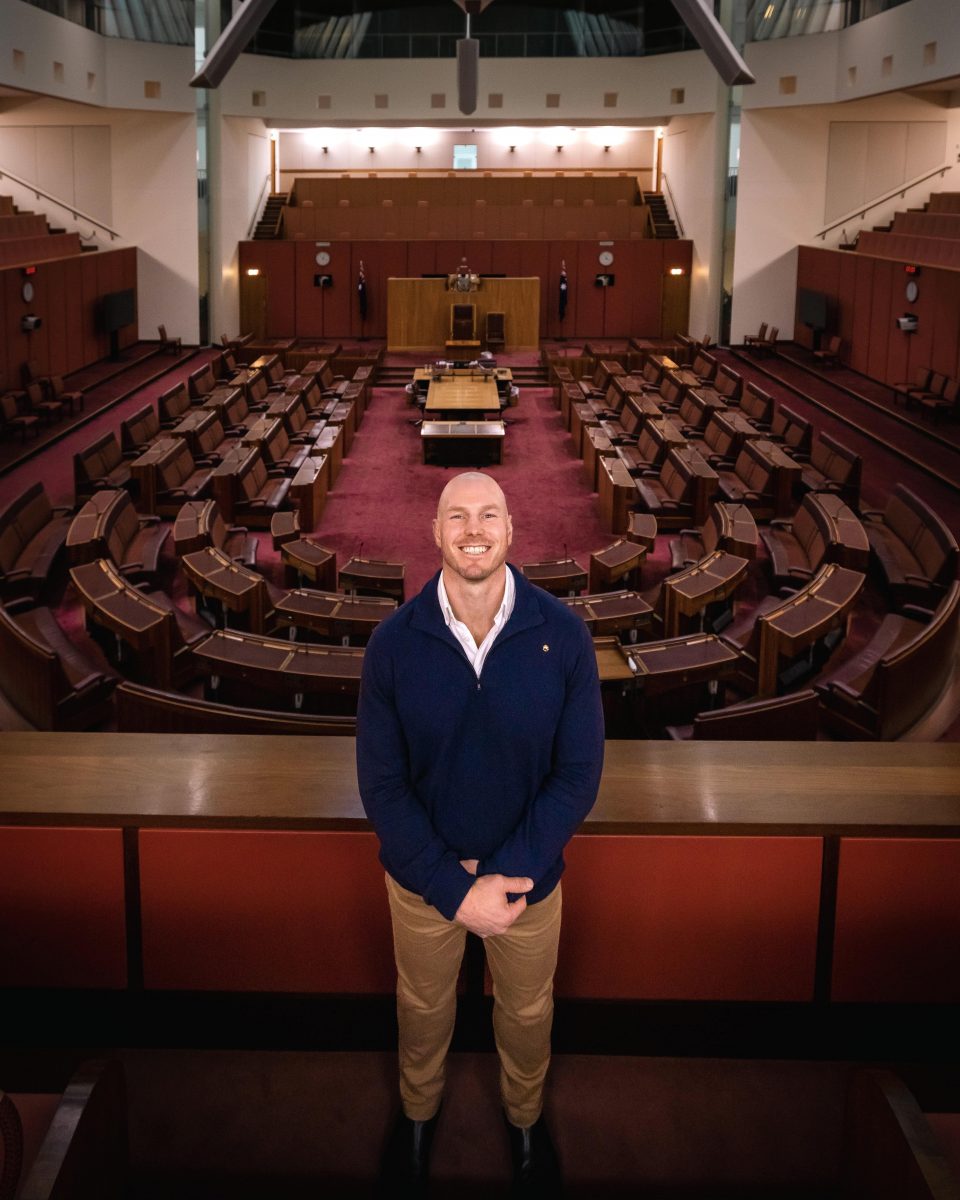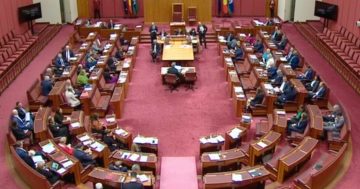
Senator David Pocock is set to introduce his first private member’s bill to the Senate. Photo: Lincoln Magee.
David Pocock wants to force politicians to factor in the harm climate change might have on future generations when considering fossil fuel projects.
The ACT independent senator will introduce his first private member’s bill on Tuesday (1 August), which seeks to legislate a positive duty of care requirement in the approval process for new developments.
Senator Pocock will introduce the Climate Change Amendment (Duty of Care and Intergenerational Equity) Bill 2023, creating a requirement for politicians and policymakers to consider the impact of climate harm on young people.
This follows Senator Pocock’s work on a draft bill with student and climate activist Anjali Sharma, the lead litigant in the 2020 Federal Court class action case against then-Minister for the Environment Sussan Ley. Ms Sharma and seven others fought to stop Ms Ley from approving a proposal to expand the Vickery coalmine in NSW, arguing the minister had a duty of care to protect young people from climate change.
Senator Pocock said the amendment would plug a “dangerous gap” in the legislative framework exposed by the case, which highlighted the need to embed in legislation the principle that governments should care about the health and wellbeing of the younger generation.
“It’s our duty as politicians and policymakers to make sure that the climate young people inherit is one they can live and thrive in,” Senator Pocock said.
“We should be thinking about young people when we make decisions. I want to be part of a parliament, and more importantly a country, that takes this responsibility seriously.
“Politicians and policymakers should have a duty of care to protect the health and wellbeing of young people and future generations.”
The bill seeks to add two conditions to decisions made under six existing pieces of legislation.
Those pieces of legislation, including the Environmental Protection and Biodiversity Conservation Act 1999 (EPBC), relate to decisions reached in the financing and development of projects that may significantly increase greenhouse gas emissions.
Senator Pocock said the impacts of climate change were “fast worsening” and the cost of inaction today would be paid by future generations, and that price will be high.
“A growing number of young Australians and their families are demanding to have their voices heard and action taken to protect their future,” he said.
“Look at any news website or television report and the deadly impacts of climate change on communities and on nature are clear to see.
“The focus on the short term – polls, the media cycle, the next election – needs to end.
“We need to be looking at how our decisions impact young people and future generations.
“We need a legislative tool that can be used in government decision-making, and this bill will deliver that.
“I look forward to my parliamentary colleagues giving serious consideration to this legislation and hopefully supporting it and the wellbeing of young people.”
Ms Sharma said the bill was born out of years of advocacy by young people leading the charge for greater climate action.
“As a young person, I’m increasingly scared about my future,” she said. “The past few years have seen climate disasters and temperatures that have broken records.
“The government can either act in accordance with its duty to young people and deliver us a safe and liveable future, or set us on a path to climate catastrophe.”
The amendment bill would apply to decisions made under the EPBC Act, the Export Finance and Insurance Corporation Act 1991, the Infrastructure Australia Act 2008, the National Reconstruction Fund Corporation Act 2023, the Northern Australia Infrastructure Facility Act 2016, and the Offshore Petroleum and Greenhouse Gas Storage Act 2006.
It imposes a statutory duty on decision-makers under those acts:
- To consider the likely impact of decisions that could harm the climate on the health and wellbeing of current and future children as the paramount consideration; and
- Not to make a decision that could harm the climate if the decision poses a material risk of harm to the health and wellbeing of current and future children in Australia.
The bill is not retrospective. Senator Pocock will ask that his bill be referred to the Senate Environment and Communications Legislation Committee for inquiry, reporting back early in 2024.





















